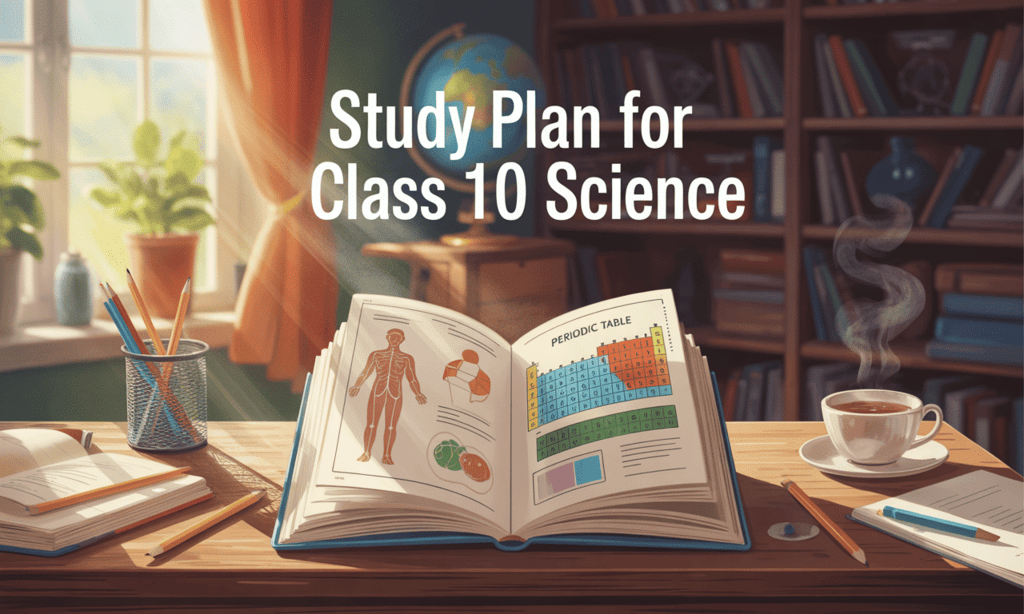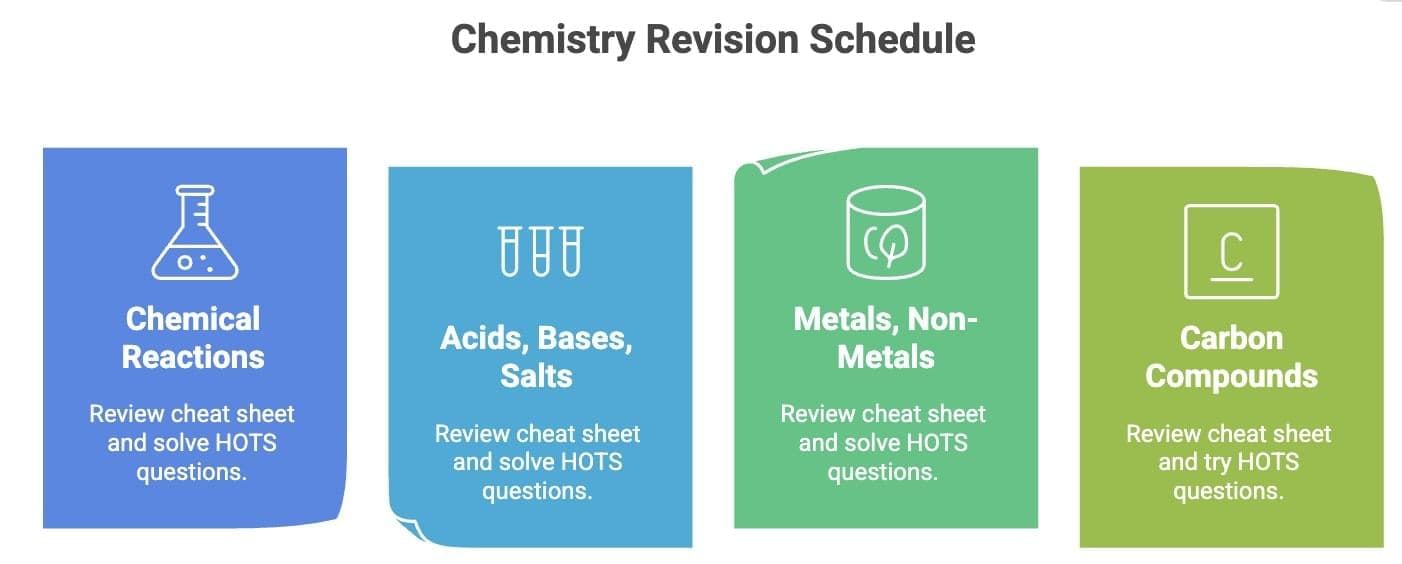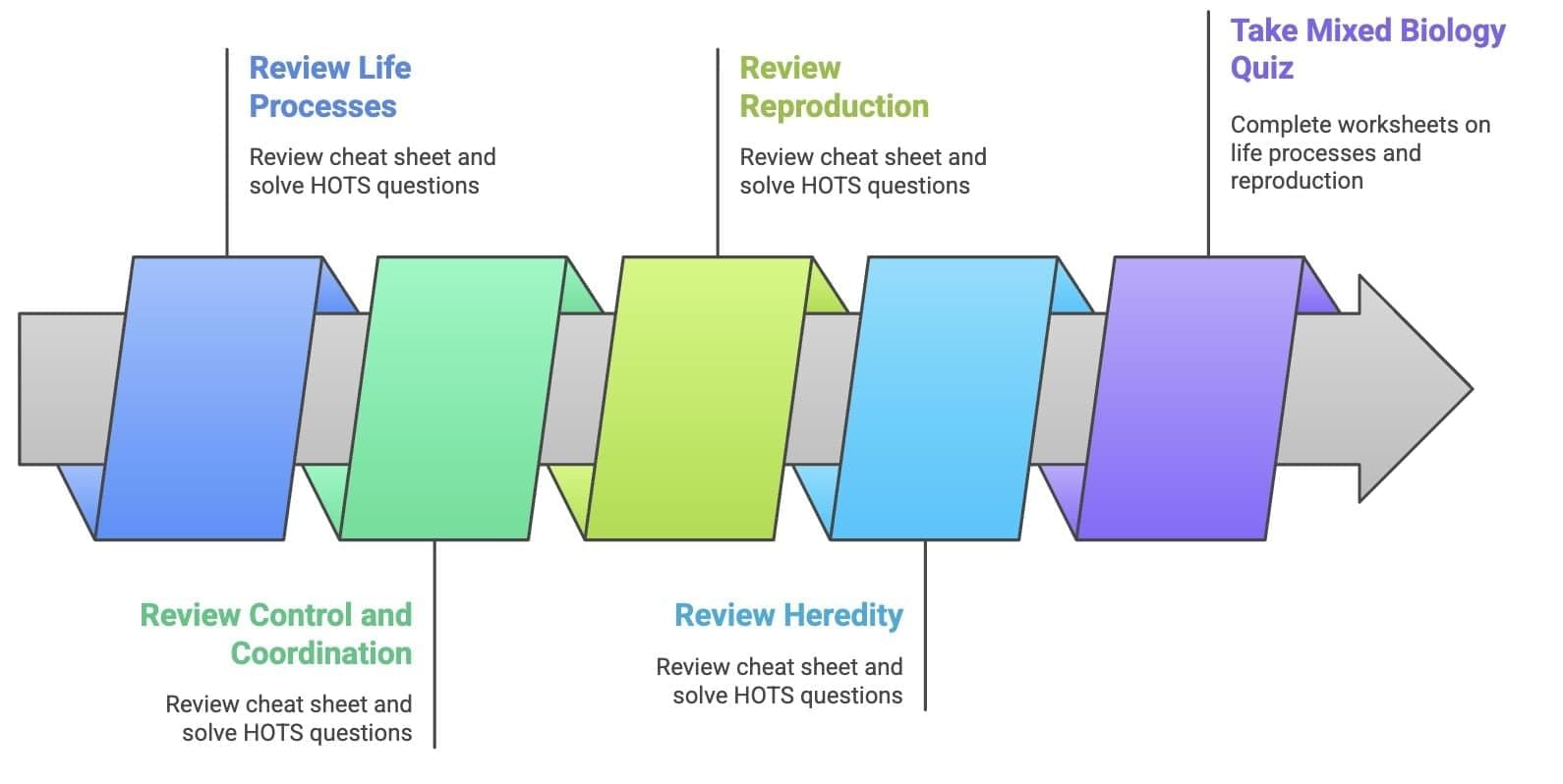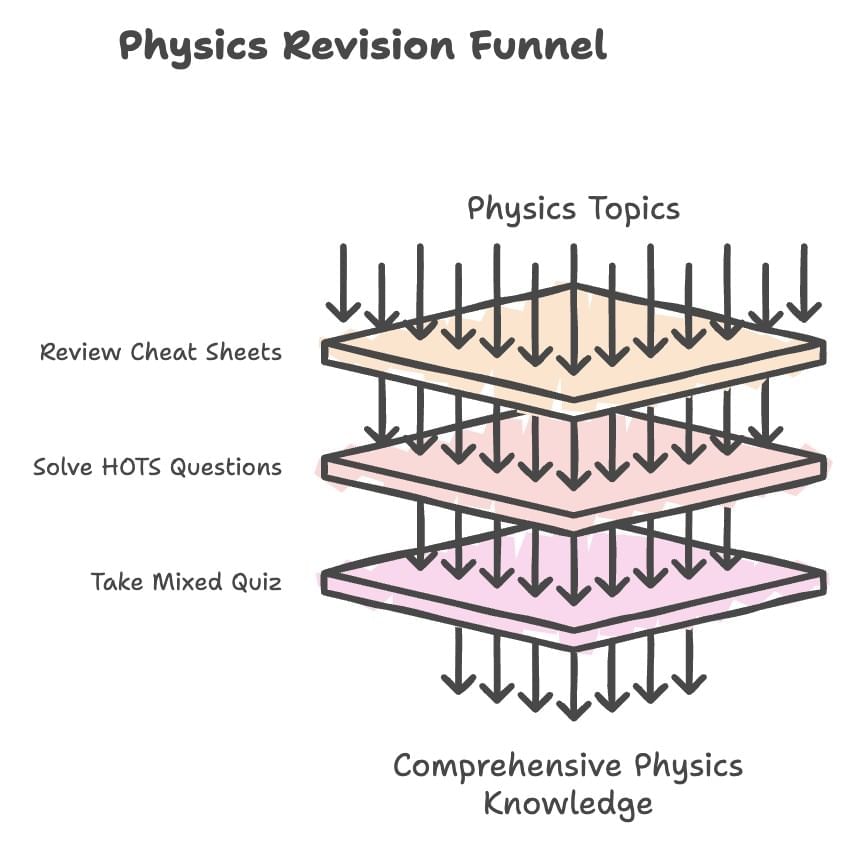Class 10 Exam > Class 10 Notes > Science Class 10 > Study Plan for Class 10 Science (2025-2026)
Study Plan for Class 10 Science (2025-2026) | Science Class 10 PDF Download

Week 1: Chemical Reactions and Equations
- Day 1: Read Chapter Notes: Chemical Reactions & Equations and watch Chemical Reactions & Chemical Bonding.
- Day 2: Study Overview: Chemical Reactions & Equations - 1 and use Flashcards: Types of Chemical Reactions.
- Day 3: Solve Short Answer Questions: Chemical Reactions & Equations and review Mindmap: Chemical Reactions & Equations.
- Day 4: Practice Practice Questions: Chemical Reactions & Equations and study Chemical Equations: Writing & Balancing.
- Day 5: Take Test: Chemical Reactions & Equations and discuss key concepts with a study partner.
Week 2: Chemical Reactions and Equations (Continued)
- Day 1: Review NCERT Textbook: Chemical Reactions & Equations and try Visual Worksheet: Chemical Equations.
- Day 2: Study Overview: Chemical Reactions & Equations - 2 and solve Lakhmir Singh & Manjit Kaur Solutions: Chemical Reactions & Equations - 1.
- Day 3: Practice Very Short Questions: Chemical Reactions and Equations and explore Infographics: Chemical Equations.
- Day 4: Attempt NCERT Solutions: Chemical Reactions & Equations and review Mnemonics: Chemical Reactions & Equations.
- Day 5: Take Unit Test: Chemical Reactions & Equations and check Unit Test (Solutions): Chemical Reactions & Equations.
Week 3: Acids, Bases and Salts
- Day 1: Read Chapter Notes: Acids, Bases & Salts and watch Acids, Bases and Salts.
- Day 2: Study Overview: Acids, Bases and Salts and use Flashcards: Acids, Bases and Salts.
- Day 3: Solve Short & Long Answer Questions: Acids, Bases & Salts and review Mindmap: Acids, Bases & Salts.
- Day 4: Practice Worksheet: Acids, Bases & Salts - 1 and study Introduction: Acids & their Properties.
- Day 5: Take Test: Acids, Bases & Salts and discuss concepts like pH with a peer.
Week 4: Acids, Bases and Salts (Continued)
- Day 1: Review NCERT Textbook: Acids, Bases & Salts and try Visual Worksheet: Acid and Bases.
- Day 2: Study Introduction: Bases & their Properties and solve Lakhmir Singh & Manjit Kaur Solutions: Acids, Bases & Salts - 1.
- Day 3: Practice Very Short Questions: Acids, Bases and Salts and explore Infographics: Acids vs Bases.
- Day 4: Attempt NCERT Solutions: Acids, Bases & Salts and review Mnemonics: Acids, Bases and Salts.
- Day 5: Take Unit Test: Acid, Bases & Salts and check Unit Test (Solutions): Acid, Bases & Salts.
Week 5: Metals and Non-metals
- Day 1: Read Chapter Notes: Metals & Non-metals and watch Metals and Non-metals.
- Day 2: Study Overview: Metals & Non-Metals - 1 and use Flashcards: Metals & Non Metals- 1.
- Day 3: Solve Short & Long Answer Questions: Metals & Non-metals and review Mindmap: Metals & Non-metals.
- Day 4: Practice Worksheet: Metals & Non-Metals - 1 and study Chemical Properties of Metals.
- Day 5: Take Test: Metals & Non-metals and discuss properties of metals with a peer.
Week 6: Metals and Non-metals (Continued)
- Day 1: Review NCERT Textbook: Metals & Non-metals and try Worksheet: Metals & Non-Metals - 2.
- Day 2: Study Physical Properties of Metals & Non-Metals and solve Lakhmir Singh & Manjit Kaur: Metals and Non-metals, Solutions- 1.
- Day 3: Practice Very Short Questions: Metals and Non-metals and explore Infographics: Metals and Non-metals.
- Day 4: Attempt NCERT Solutions: Metals & Non-metals and review Mnemonics: Metals and Non-Metals.
- Day 5: Take Unit Test: Metals & Non-metals and check Unit Test (Solutions): Metals & Non-metals.
Week 7: Carbon and its Compounds
- Day 1: Read Chapter Notes: Carbon & Its Compounds and watch Carbon & its Compounds.
- Day 2: Study Overview: Carbon Compounds & Covalent Bonding in Carbon Compounds and use Flashcards: Carbon & its Compounds- 1.
- Day 3: Solve Short & Long Answer Questions: Carbon & its compounds and review Mindmap: Carbon & its compounds.
- Day 4: Practice Worksheet: Carbon and its Compounds and study Covalent Bonding & Versatile Nature of Carbon.
- Day 5: Take Test: Carbon & its Compounds - 1 and discuss carbon compounds with a peer.
Week 8: Carbon and its Compounds (Continued)
- Day 1: Review NCERT Textbook: Carbon & its Compounds and try Nomenclature of Carbon and its compounds.
- Day 2: Study Some Important Carbon Compounds – Ethanol And Ethanoic Acid and solve Lakhmir Singh & Manjit Kaur: Carbon And Its Compounds, Solutions- 1.
- Day 3: Practice Very Short Questions: Carbon and its compounds and explore Mnemonics: Carbon and its Compounds.
- Day 4: Attempt NCERT Solutions: Carbon & its Compounds and review Cleansing Action of Soaps & Detergents.
- Day 5: Take Unit Test: Carbon and its Compounds and check Unit Test (Solutions): Carbon and its Compounds.
Week 9: Life Processes
- Day 1: Read Chapter Notes: Life Processes- 1 and watch What are Life Processes.
- Day 2: Study Life Processes: Nutrition & Metabolism and use Flashcards: Life Processes- 1.
- Day 3: Solve Short & Long Answer Questions: Life Processes and review Mindmap: Life Processes.
- Day 4: Practice Worksheet: Life Processes - 1 and study Autotrophic Nutrition.
- Day 5: Take Test: Respiration - 1 and discuss nutrition with a peer.
Week 10: Life Processes (Continued)
- Day 1: Review NCERT Textbook: Life Processes and try Visual Worksheet: Digestive System Anatomy.
- Day 2: Study Transportation in Human Beings: Circulatory System & The Human Heart and solve Lakhmir Singh & Manjit Kaur Solutions: Life Processes - 1.
- Day 3: Practice Very Short Questions: Life Processes and explore Infographics: Respiratory System.
- Day 4: Attempt NCERT Solutions: Life Processes and review Mnemonics: Life Processes.
- Day 5: Take Unit Test: Life Processes and check Unit Test Solutions: Life Processes.
Week 11: Control and Coordination
- Day 1: Read Chapter Notes: Control & Coordination and watch Control and Coordination.
- Day 2: Study Overview: Control & Coordination and use Flashcards: Control & Coordination- 1.
- Day 3: Solve Short & Long Answer Questions: Control & Coordination and review Mindmap: Control & Coordination.
- Day 4: Practice Worksheet: Control and Coordination and study Nervous System.
- Day 5: Take Test: Control & Coordination - 1 and discuss the nervous system with a peer.
Week 12: Control and Coordination (Continued)
- Day 1: Review NCERT Textbook: Control & Coordination and try Worksheet Solutions: Control and Coordination.
- Day 2: Study Chemical Coordination In Animals - Endocrine System and solve Lakhmir Singh & Manjit Kaur: Control & Coordination, Solutions- 1.
- Day 3: Practice Very Short Questions: Control and Coordination and explore Infographics: Nervous System.
- Day 4: Attempt NCERT Solutions: Control & Coordination and review Mnemonics: Control & Coordination.
- Day 5: Take Unit Test: Control and Coordination and check Unit Test (Solutions): Control and Coordination.
Week 13: How do Organisms Reproduce?
- Day 1: Read Chapter Notes: How do Organisms Reproduce and watch How do Organisms Reproduce?.
- Day 2: Study Quick Revision: Asexual Reproduction and use Flashcards: How do Organisms Reproduce.
- Day 3: Solve Short & Long Answer Questions: How do Organisms Reproduce? and review Mindmap: How do Organisms Reproduce?.
- Day 4: Practice Worksheet: How do Organisms Reproduce? and study Sexual Reproduction In Flowering Plants.
- Day 5: Take Test: Reproduction & Its Kinds and discuss reproduction types with a peer.
Week 14: How do Organisms Reproduce? (Continued)
- Day 1: Review NCERT Textbook: How do Organisms Reproduce and try Visual Worksheet: Cell Cycle.
- Day 2: Study Reproduction in Human Beings and solve Lakhmir Singh & Manjit Kaur: How do Organisms Reproduce?, Solutions- 1.
- Day 3: Practice Very Short Questions: How do Organisms Reproduce? and explore Infographics: Human Reproductive System.
- Day 4: Attempt NCERT Solutions: How do Organisms Reproduce? and review Mnemonics: Reproduction.
- Day 5: Take Unit Test: How Do Organisms Reproduce? and check Unit Test (Solutions): How Do Organisms Reproduce?.
Week 15: Heredity
- Day 1: Read Chapter Notes: Heredity and watch Heredity.
- Day 2: Study Mendel's Contributions and use Flashcards: Heredity.
- Day 3: Solve Short & Long Answer Questions: Heredity and review Mindmap: Heredity.
- Day 4: Practice Diagram Based Questions: Heredity and study DNA & Sex Determination.
- Day 5: Take Test: Heredity - 1 and discuss genetics with a peer.
Week 16: Heredity (Continued)
- Day 1: Review NCERT Textbook: Heredity and try Visual Worksheet: Punnett Square.
- Day 2: Study What is Variation & Heredity? and solve Lakhmir Singh & Manjit Kaur: Heredity and Evolution, Solutions- 1.
- Day 3: Practice Very Short Questions: Heredity and Evolution and explore Mnemonics: Heredity.
- Day 4: Attempt NCERT Solutions: Heredity and review Quick Revision: Heredity.
- Day 5: Take Unit Test: Heredity and check Unit Test (Solutions): Heredity.
Week 17: Light - Reflection and Refraction
- Day 1: Read Chapter Notes: Light- Reflection & Refraction and watch Reflection & Laws of Reflection.
- Day 2: Study Overview: Light - Reflection & Refraction and use Flashcards: Light-Reflection and Refraction.
- Day 3: Solve Short & Long Answer Questions: Light - Reflection & Refraction and review Mindmap: Ray Optics - Light: Reflection & Refraction.
- Day 4: Practice Worksheet: Light - Reflection and Refraction and study Image Formation: Concave & Convex Mirror.
- Day 5: Take Test: Reflection of Light and discuss reflection with a peer.
Week 18: Light - Reflection and Refraction (Continued)
- Day 1: Review NCERT Textbook: Light - Reflection & Refraction and try Infographics: Lenses.
- Day 2: Study Refraction of Light - Total Internal Reflection and solve Lakhmir Singh & Manjit Kaur: Refraction of Light, Solutions - 1.
- Day 3: Practice Short Questions: Light - Reflection and Refraction and explore Mnemonics: Light - Reflection and Refraction.
- Day 4: Attempt NCERT Solutions: Light - Reflection & Refraction and review Mirror Formula & Magnification.
- Day 5: Take Unit Test: Light - Reflection and Refraction and check Unit Test (Solutions): Light - Reflection and Refraction.
Week 19: The Human Eye and the Colorful World
- Day 1: Read Chapter Notes: The Human Eye & Colorful World and watch The Human Eye and the Colorful World.
- Day 2: Study Overview: The Human Eye & the Colorful World and use Flashcards: The Human Eye & the Colorful World.
- Day 3: Solve Short & Long Answer Questions: The Human Eye & the Colorful World and review Mindmap: Ray Optics: The Human Eye & Colorful World.
- Day 4: Practice Worksheet: The Human Eye and Colorful World and study The Human Eye.
- Day 5: Take Test: The Human Eye & the Colorful World - 1 and discuss vision defects with a peer.
Week 20: The Human Eye and the Colorful World (Continued)
- Day 1: Review NCERT Textbook: The Human Eye & the Colorful World and try Visual Worksheet: Parts of The Eye.
- Day 2: Study Dispersion of Light and solve Lakhmir Singh & Manjit Kaur: The Human Eye & The Colorful World, Solutions - 1.
- Day 3: Practice Very Short Questions: The Human Eye and the Colorful World and explore Infographics: The Human Eye.
- Day 4: Attempt NCERT Solutions: The Human Eye & the Colorful World and review Mnemonics: The Human Eye and the Colorful World.
- Day 5: Take Unit Test: The Human Eye and The Colorful World and check Unit Test (Solutions): The Human Eye and The Colorful World.
Week 21: Electricity
- Day 1: Read Chapter Notes: Electricity and watch Electric Current & Potential.
- Day 2: Study Overview: Electricity and use Flashcards: Electricity - 1.
- Day 3: Solve Short & Long Answer Questions: Electricity and review Mindmap: Electricity.
- Day 4: Practice Worksheet: Electricity and study Ohm's Law.
- Day 5: Take Test: Electricity - 1 and discuss circuits with a peer.
Week 22: Electricity (Continued)
- Day 1: Review NCERT Textbook: Electricity and try Visual Worksheet: Ohm's Law (with Solutions).
- Day 2: Study Resistance: Series and Parallel and solve Lakhmir Singh & Manjit Kaur: Electricity, Solutions - 1.
- Day 3: Practice Very Short Questions: Electricity and explore Infographics: Electricity.
- Day 4: Attempt NCERT Solutions: Electricity and review Mnemonics: Electricity.
- Day 5: Take Unit Test: Electricity and check Unit Test (Solutions): Electricity.
Week 23: Magnetic Effects of Electric Current
- Day 1: Read Chapter Notes: Magnetic Effects of Electric Current and watch Magnetic Effect of Current.
- Day 2: Study Overview: Magnetic Effects of Electric Current and use Flashcards: Magnetic Effects of Electric Current.
- Day 3: Solve Short & Long Answer Questions: Magnetic Effects and review Mindmap: Magnetic Effects of Current.
- Day 4: Practice Worksheet: Magnetic Effects of Current and study Flemings Left Hand Rule.
- Day 5: Take Test: Magnetic Effects of Electric Current and discuss magnetic fields with a peer.
Week 24: Magnetic Effects of Electric Current (Continued)
- Day 1: Review NCERT Textbook: Magnetic Effects of Current and try Visual Worksheet: Magnetic Field Lines.
- Day 2: Study Electric Motor and solve Lakhmir Singh & Manjit Kaur: Magnetic Effects of Electric Current, Solutions - 1.
- Day 3: Practice Very Short Questions: Magnetic Effects of Current and explore Infographics: How Do Magnets Work.
- Day 4: Attempt NCERT Solutions: Magnetic Effects of Electric Current and review Mnemonics: Magnetic Effects.
- Day 5: Take Unit Test: Magnetic Effects of Electric Current and check Unit Test (Solutions): Magnetic Effects of Electric Current.
Week 25: Our Environment
- Day 1: Read Chapter Notes: Our Environment and watch Our Environment.
- Day 2: Study Ecosystem & Food Chain and use Flashcards: Our Environment.
- Day 3: Solve Short & Long Answer Questions: Our Environment and review Mindmap: Our Environment.
- Day 4: Practice Worksheet: Our Environment and study Garbage Management & Waste.
- Day 5: Take Test: Our Environment - 1 and discuss ecosystems with a peer.
Week 26: Our Environment (Continued)
- Day 1: Review NCERT Textbook: Our Environment and try Infographics: Food Chains.
- Day 2: Study Food Web and Food Chain and solve Lakhmir Singh & Manjit Kaur Solutions: Our Environment - 1.
- Day 3: Practice Very Short Questions: Our Environment and explore Infographics: Environment.
- Day 4: Attempt NCERT Solutions: Our Environment and review Mnemonics: Our Environment.
- Day 5: Take Unit Test: Our Environment and check Unit Test (Solutions): Our Environment.
Week 27: Revision Week (Chemistry Chapters)
- Day 1: Review Cheat Sheet: Chemical Reactions and Equations and solve HOTS Questions: Chemical Reactions & Equations.
- Day 2: Review Cheat Sheet: Acids, Bases and Salts and solve HOTS Questions: Acids, Bases and Salts.
- Day 3: Review Cheat Sheet: Metals and Non-Metals and solve HOTS Questions: Metals and Non-Metals.
- Day 4: Review Cheat Sheet: Carbon and its Compounds and try HOTS Questions: Carbon and its Compounds.
- Day 5: Take a mixed chemistry quiz from Practice Questions: Chemical Reactions & Equations and Worksheet: Acids, Bases & Salts - 1.

Week 28: Revision Week (Biology Chapters)
- Day 1: Review Cheat Sheet: Life Processes and solve HOTS Questions: Life Processes.
- Day 2: Review Cheat Sheet: Control and Coordination and solve HOTS Questions: Control and Coordination.
- Day 3: Review Cheat Sheet: How do Organisms Reproduce and solve HOTS Questions: How do Organisms Reproduce.
- Day 4: Review Cheat Sheet: Heredity and try HOTS Questions: Heredity.
- Day 5: Take a mixed biology quiz from Worksheet: Life Processes - 1 and Worksheet: How do Organisms Reproduce.

Week 29: Revision Week (Physics Chapters)
- Day 1: Review Cheat Sheet: Light - Reflection and Refraction and solve HOTS Questions: Light - Reflection and Refraction.
- Day 2: Review Cheat Sheet: The Human Eye and the Colorful World and solve HOTS Questions: The Human Eye and the Colorful World.
- Day 3: Review Cheat Sheet: Electricity and solve HOTS Questions: Electricity.
- Day 4: Review Cheat Sheet: Magnetic Effects of Electric Current and try HOTS Questions: Magnetic Effects of Electric Current.
- Day 5: Take a mixed physics quiz from Worksheet: Light - Reflection and Refraction and Worksheet: Electricity.

Week 30: Mock Tests & Past Papers
- Day 1: Attempt Sample Paper: Science Class 10 and review answers.
- Day 2: Solve Previous Year Paper: Science Class 10 - 2024 and check solutions.
- Day 3: Take Mock Test: Science Class 10 and analyze weak areas.
- Day 4: Review Cheat Sheet: Our Environment and solve HOTS Questions: Our Environment.
- Day 5: Attempt another Sample Paper: Science Class 10 - 2 and discuss with a peer.
Week 31: Mock Tests & Past Papers
- Day 1: Solve Previous Year Paper: Science Class 10 - 2023 and review solutions.
- Day 2: Take Mock Test: Science Class 10 - 2 and focus on time management.
- Day 3: Review all cheat sheets from Science Class 10 and solve mixed questions.
- Day 4: Attempt Sample Paper: Science Class 10 - 3 and analyze performance.
- Day 5: Discuss common mistakes with a teacher and revise weak topics using Science Class 10 resources.
Week 32: Full Syllabus Revision
- Day 1: Revise Chemistry chapters using Full Syllabus Revision: Chemistry and solve mixed questions.
- Day 2: Revise Biology chapters using Full Syllabus Revision: Biology and attempt HOTS
Tips for Success
- Stick to the schedule and allocate 30-45 minutes daily for focused study.
- Use flashcards and mindmaps for quick revision of key concepts.
- Practice diagram-based and case-based questions to strengthen analytical skills.
- Review previous year papers to understand exam patterns and question types.
- Take short breaks during study sessions to stay fresh and focused.
- Discuss concepts with friends or teachers to clarify doubts.
- Attempt mock tests under timed conditions to build exam confidence.
- Keep a notebook for important formulas, definitions, and mnemonics.

The document Study Plan for Class 10 Science (2025-2026) | Science Class 10 is a part of the Class 10 Course Science Class 10.
All you need of Class 10 at this link: Class 10
|
80 videos|569 docs|80 tests
|
FAQs on Study Plan for Class 10 Science (2025-2026) - Science Class 10
| 1. What are the main types of chemical reactions covered in the syllabus? |  |
Ans. The main types of chemical reactions covered in the syllabus include combination reactions, decomposition reactions, displacement reactions, and redox reactions. Each type has distinct characteristics, such as how reactants combine or break apart, and understanding these types is essential for predicting the outcomes of chemical processes.
| 2. How do acids, bases, and salts interact with each other? |  |
Ans. Acids, bases, and salts interact through neutralization reactions. When an acid reacts with a base, they produce water and a salt. For example, hydrochloric acid (HCl) reacts with sodium hydroxide (NaOH) to form water (H₂O) and sodium chloride (NaCl). Understanding pH and the properties of these substances is crucial for various applications in chemistry.
| 3. What are some common properties of metals and non-metals discussed in the syllabus? |  |
Ans. Common properties of metals include conductivity, malleability, ductility, and luster, while non-metals generally exhibit poor conductivity, brittleness, and lack of luster. Metals tend to lose electrons and form cations, whereas non-metals gain electrons to form anions. This distinction is crucial in understanding chemical bonding and reactions.
| 4. Why is carbon considered a unique element in chemistry? |  |
Ans. Carbon is considered unique because of its ability to form four covalent bonds, allowing it to create a vast array of organic compounds. This versatility leads to the formation of chains and rings, resulting in diverse structures like hydrocarbons, carbohydrates, proteins, and nucleic acids. The study of carbon compounds is fundamental in organic chemistry.
| 5. What are the key life processes discussed in the syllabus, and why are they important? |  |
Ans. The key life processes discussed include nutrition, respiration, transportation, and excretion. These processes are vital for maintaining homeostasis and supporting life functions in organisms. Understanding these processes helps in appreciating how living organisms interact with their environment and sustain themselves at a cellular level.
Related Searches






















